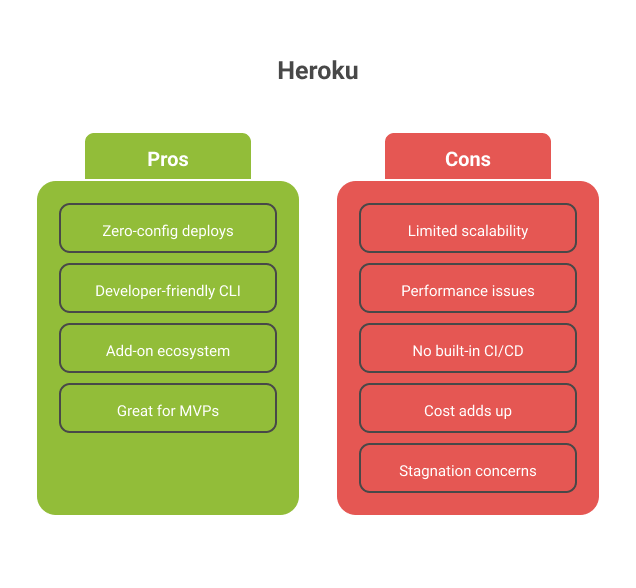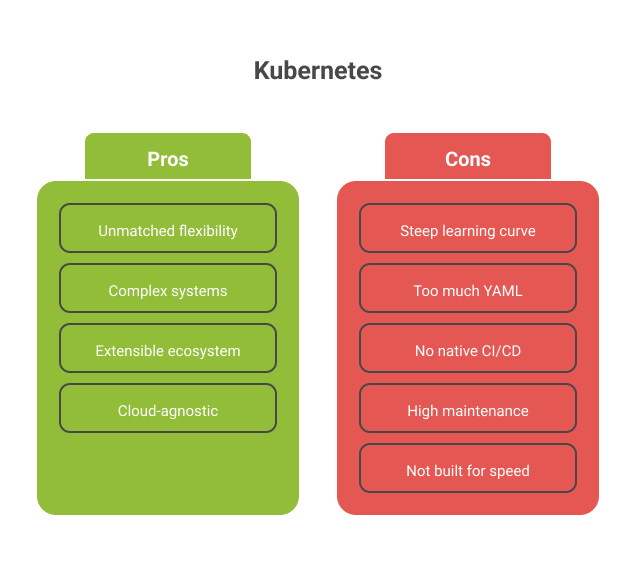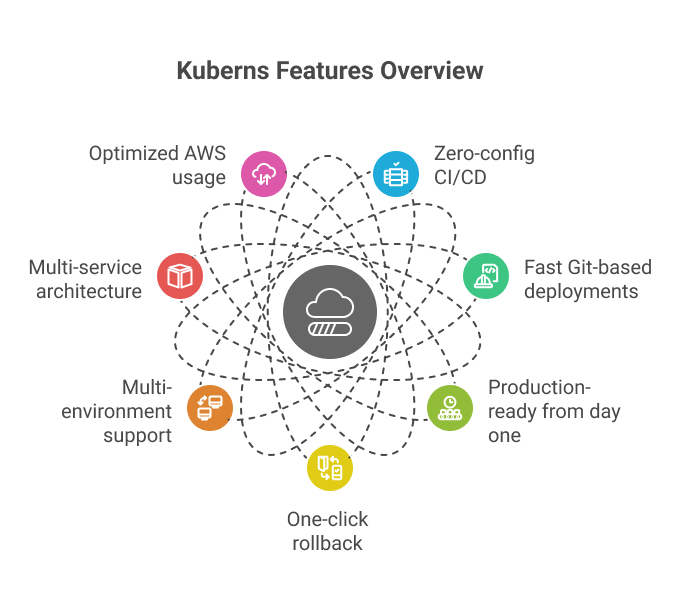Published
- 7 min read
Heroku, Kubernetes, or Kuberns: What’s the Best platform in 2025?

Choosing the right platform to deploy and scale your application in 2025 isn’t easy. Heroku made deployment simple, but often falls short at scale. Kubernetes became the standard for flexibility, but requires significant DevOps effort. Kuberns is redefining the experience by offering AI-powered automation, zero-config CI/CD, and infrastructure built on AWS without the operational burden.
So, which one fits your team best in 2025?
In this guide, we’ll compare Heroku vs Kubernetes vs Kuberns in terms of cost, features, usability, and scalability. You’ll also see real-world use cases, when to use each platform, and why more teams are switching to modern tools like Kuberns for production-ready deployments.
Heroku: Simple Deployments, but with Limits
 Heroku became popular by making app deployment as easy as a single Git push. It abstracts away servers, containers, and infrastructure setup, letting developers focus on writing code and getting their apps live in seconds.
Heroku became popular by making app deployment as easy as a single Git push. It abstracts away servers, containers, and infrastructure setup, letting developers focus on writing code and getting their apps live in seconds.
Why Teams Still Love Heroku
- Zero-config deploys: Push to Git and your app is live.
- Developer-friendly CLI: Simple commands for scaling, logs, and rollbacks.
- Add-on ecosystem: Plug in databases, caching, email services, and more from a large marketplace.
- Great for MVPs and prototypes: Fast setup with minimal DevOps.
Where Heroku Starts to Struggle
- Limited scalability: Vertical scaling becomes expensive fast, and there’s little native support for microservices.
- Performance issues: Background workers and dynos often experience cold starts and slow response times.
- No built-in CI/CD: You’ll need third-party tools to implement modern pipelines.
- Cost adds up: Pricing can escalate quickly as usage grows or additional services are added.
- Stagnation concerns: The platform hasn’t evolved as fast as developer needs have.
Who Should Use Heroku?
Heroku is great for solo developers, students, and small teams launching early-stage projects. But for long-term scalability, performance, and cost efficiency, it often falls short.
Looking for a more modern, flexible alternative? Check out our comparison of the Best Heroku Alternatives in 2025.
Kubernetes: Powerful, But DevOps-Heavy
 Kubernetes remains the gold standard for container orchestration in 2025. It gives developers and enterprises complete control over how applications run, scale, and self-heal across cloud, on-premise, or hybrid environments.
Kubernetes remains the gold standard for container orchestration in 2025. It gives developers and enterprises complete control over how applications run, scale, and self-heal across cloud, on-premise, or hybrid environments.
Why Kubernetes Is Still a Top Choice
- Unmatched flexibility: You can define exactly how your app behaves, scales, and communicates across services.
- Built for complex systems: Kubernetes is ideal for microservices, service meshes, and multi-region architectures.
- Extensible ecosystem: Tools like Helm (for packaging), ArgoCD (for GitOps), and Prometheus (for monitoring) plug right in.
- Cloud-agnostic: You can deploy across AWS, GCP, Azure, or your own servers.
Where Kubernetes Falls Short
- Steep learning curve: Getting started requires significant DevOps experience and knowledge of containerization.
- Too much YAML: Everything from services, ingress, and volumes to secrets requires extensive YAML configuration.
- No native CI/CD: You’ll need to set up and manage your own pipeline, often combining tools like GitHub Actions, ArgoCD, and Tekton.
- High maintenance overhead: Managing clusters, scaling policies, and upgrades consumes time and resources.
- Not built for speed: Spinning up environments or troubleshooting issues takes longer compared to modern PaaS platforms.
Is It Right for You?
If you’re running a large-scale app with a dedicated DevOps team and need full infrastructure control, Kubernetes delivers. But if you’re a startup, indie developer, or SaaS team trying to move fast, it’s often more complexity than you need..
Curious about simpler alternatives? Explore our full guide on Kubernetes alternatives you actually need.
Kuberns: Built for Modern Developer Teams
 Kuberns combines the ease of Heroku with the power of Kubernetes, without requiring you to touch infrastructure or write a single YAML file. It runs on optimized AWS infrastructure but abstracts away DevOps complexity with a clean UI, zero-config CI/CD, and Git-based automation.
Kuberns combines the ease of Heroku with the power of Kubernetes, without requiring you to touch infrastructure or write a single YAML file. It runs on optimized AWS infrastructure but abstracts away DevOps complexity with a clean UI, zero-config CI/CD, and Git-based automation.
Why Developers Are Choosing Kuberns
- Zero-config CI/CD: Just connect your GitHub repo and push code. No scripts, no YAML, no setup.
- Fast Git-based deployments: Deploy from Git in minutes with auto-detected environments and prebuilt containers.
- Production-ready from day one: Real-time logs, error alerts, performance monitoring, and health checks are all included.
- One-click rollback: Revert to any previous version instantly, without touching your pipeline or server.
- Multi-environment support: Spin up staging, dev, and production environments with isolated URLs and resources.
- Multi-service architecture: Works seamlessly with monoliths, microservices, background jobs, and worker queues.
- Optimized AWS usage: Since Kuberns runs your workloads on shared AWS infra with intelligent resource allocation, many teams report up to 40% savings on cloud costs.
Who Kuberns Is Best For?
Kuberns is ideal for startups, product teams, and fast-moving developers who want Heroku-level simplicity but need Kubernetes-level power. You don’t need to manage infrastructure, scale manually, or stitch together third-party tools. Kuberns gives you a complete deployment system out of the box.
Want to see how it works? Read What Is Kuberns: The Simplest Way to Build, Deploy, and Scale Full-Stack Apps for a full breakdown.
Platform Comparison: Heroku vs Kubernetes vs Kuberns
If you’re deciding between Heroku, Kubernetes, and Kuberns, it’s important to compare them across key dimensions like ease of use, automation, scalability, and cost predictability. Here’s how they stack up:\
| Feature | Heroku | Kubernetes | Kuberns |
|---|---|---|---|
| Ease of Use | Good | Poor | Excellent |
| DevOps Required | Low | High | None |
| CI/CD Built-In | Basic | Not Included | Fully Automated |
| Microservices Support | Limited | Extensive | Extensive |
| Rollbacks | Basic | Manual | One-Click |
| Environments (Staging, Prod) | Limited | Manual Setup | Prebuilt & Isolated |
| Platform Fees | Yes | No | No |
| Scaling | Manual Simple | Complex | Automatic |
| Logs & Monitoring | Add-ons Needed | Requires Setup | Built-in |
What This Means for You
If you’re looking for a platform that balances speed, scalability, and simplicity, Kuberns is the clear choice in 2025. Unlike Heroku, which becomes restrictive as your app grows, or Kubernetes, which demands time and DevOps expertise, Kuberns gives you the best of both without the complexity.
If you’re building apps that need fast iteration, safe deployments, and production-grade infrastructure without the operational burden, Kuberns is likely the best fit in 2025.
Why Kuberns Is the Smarter Choice in 2025
If you’re building and scaling apps in 2025, you need more than just a working deployment platform. you need speed, automation, and cost-efficiency without infrastructure hassle.
Kuberns delivers all of that.
Unlike Heroku, which gets expensive and limited as you grow, or Kubernetes, which demands a full DevOps setup, Kuberns gives you everything out of the box. No YAML, no Dockerfiles, no plugins.
Why Kuberns stands out:
- Instant Git-based deployments with built-in CI/CD
- Staging, production, rollback, and monitoring included
- Up to 40% lower AWS costs with optimized infrastructure
- No platform fees. No DevOps team needed.
If you’re a fast-moving team or startup looking to scale with less complexity, Kuberns is the platform built for you.
Want to see how it compares? 👉 Explore our full platform comparison
The Smarter Way to Deploy in 2025
If you’re building modern apps, the deployment platform you choose will shape your team’s speed, scalability, and costs. Heroku works for quick starts but struggles at scale. Kubernetes gives you power, but at the cost of complexity. Kuberns simplifies everything by combining zero-config CI/CD, full observability, and optimized AWS infrastructure in one seamless platform.
Want to deploy faster, scale easier, and spend less on cloud?
